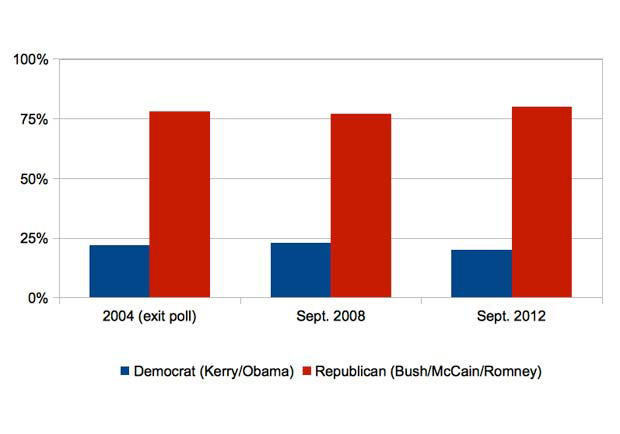A year ago, some pundits predicted that many evangelicals would not support Mitt Romney's presidential run because of his Mormon faith. They were wrong. A new poll shows evangelicals remain the base of the Republican Party, favoring Romney over Barack Obama four-to-one.
The Pew Research Center for the People and the Press reports that 74 percent of registered evangelicals will vote for Romney. Among likely evangelical voters who have made up their mind on the presidential candidates, 80 percent will vote Republican.
Support for Romney is remarkably similar to the backing McCain and Bush received from evangelicals. According to exit polls, the two previous GOP candidates each garnered around 78 percent of the evangelical vote.
Despite a history of Republican voting, some political pontificators predicted that evangelicals would be apprehensive about an LDS candidate. The picture of evangelicals as religious partisans has itself proven to be little more than caricature and stereotype.
One reason for the miscalculation is that a few religious leaders spoke out at political events against voting for a Mormon, particularly when there were evangelicals in the race. Robert Jeffress, senior pastor of First Baptist Church in Dallas, Texas, introduced Gov. Rick Perry at last year's Values Voter Summit. He called Mormonism a "cult" and questioned Romney's record on social issues.
"Every true, born again follower of Christ ought to embrace a Christian over a non-Christian,"Jeffress said.
Jeffress' remarks were picked up as evidence that evangelicals would be hesitant to back a Mormon candidate. But even in the midst of the controversy, Jeffress saidhe would support Romney in a general election.
This year, Jeffress is backing Romney and is telling other evangelical pastors to do the same.Speaking to pastorslast Monday in San Antonio, Jeffress said that giving Romney your vote is not the same as endorsing his religion.
"The fear among evangelicals is that this would legitimize a religion that we believe doesn't lead people to God,"Jeffress said. "And so those of us who have said yes (to Romney), we're going to support him as the lesser of two evils, but at the same time, we're making very clear that we're doing so realizing Mormonism is not Christianity."
At this year's Values Voter Summit, held September 14-16, the tone was very different. There was no anti-Mormon rhetoric; Jeffress was not invited to speak; and organizers talked about the growing enthusiasm for the Republican ticket.
Speaking at the National Press Club before this year's summit, Family Research Council president Tony Perkins said enthusiasm for Romney among social conservatives is building. Perkins pointed out that Romney's Mormonism could be a plus.
"We're not hiring a pastor in chief. We're not asking him to lead a national church—we don't want a national church," Perkins said. "We want religious freedom, and I think someone who has been part of a persecuted religion is going to be even more sensitive to the issue of religious freedom."
Evangelical backlash against a Mormon candidate has proven to be a stereotype. True, many—but not all—evangelicals do not view Mormons as Christians. Anearlier Pew poll found that nearly two-thirds of evangelicals believe that Mormonism is part of Christianity, but only one fifth of evangelicals said they were uncomfortable voting for a Mormon presidential candidate. Evangelicals were not the only ones who were uneasy about a Mormon candidate.
Liberal Democrats and those with no religion were also resistant to voting for a Mormon, albeit for different reasons. Wall Street Journal columnist Bret Stephens said this week that Mormons are often ridiculed in popular culture, as in the Broadway hit The Book of Mormon.Stephens said there is an "emerging liberal consensus … that it's okay to concede the fundamentalist premise that religious belief ought to be entitled to the highest possible degree of social deference—except when Mormons and sundry Christian rubes are concerned."
Social conservatives' unease with Romney had as much to do with his record on healthcare, gay rights, and abortion than with his religion. Many would have agreed with The Onion's satirical headline in March: "63% Of Americans Say They Have A Problem With A Mormon President Who Is Also Mitt Romney."
Given the choice, many social conservatives would prefer a Rick Santorum over a former moderate like Mitt Romney. In seven weeks, however, the choice is between Romney and Barack Obama. For many evangelicals, it would be much better to have a Mormon Republican in the White House than Obama, a self-professed Christian (granted, one third of conservative Republicans believe Obama is a Muslim, but that'sanother story).
Mike Huckabee spoke directly to the issue of a candidate's faith duringhis speech at the Republican National Convention. "I care far less as to where Mitt Romney takes his family to church, than I do about where he takes this country," Huckabee said.










